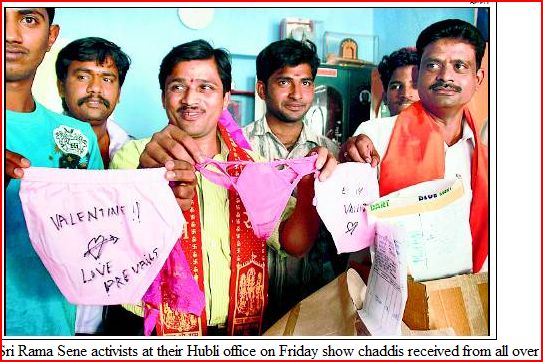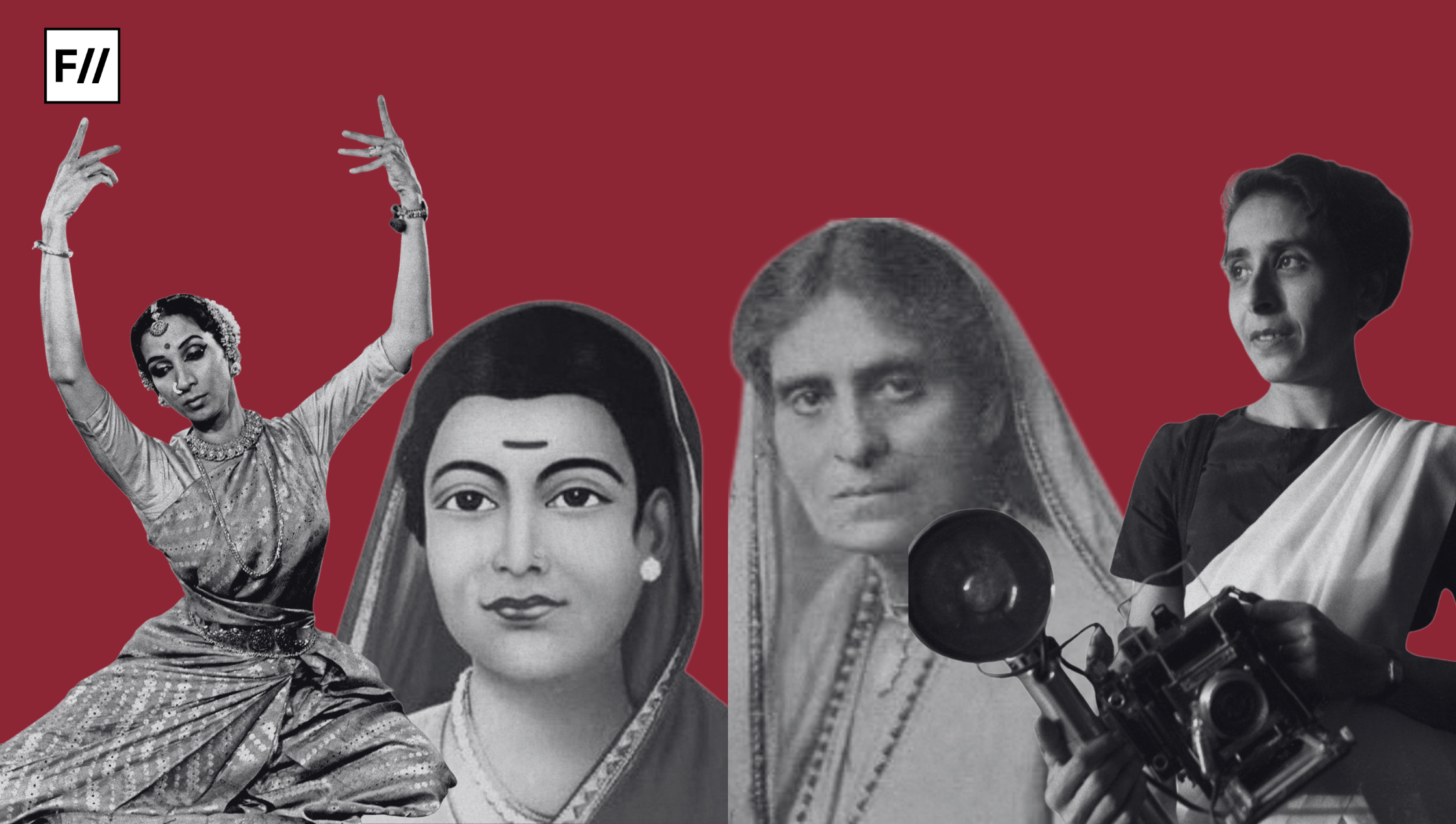On 24th January, 2009, a group of young men and women were attacked by the members of the Sri Ram Sena at Amnesia: the Lounge in Mangalore for ‘sabotaging’ Indian culture by drinking and partying together.

To counter this attack and bring attention to this atrocious act, Nisha Susan, a Delhi-based journalist launched a Facebook group called ‘Consortium of Pub-Going, Loose and Forward Women’ on 5th February, 2009. The group garnered a lot of attention worldwide, and the personal was made political. The ‘Pink Chaddi Campaign’ (or, Pink Underwear Campaign) was a campaign undertaken by the group members as a non-violent means of protesting against the Right-wing extremist group, Sri Ram Sena’s violent attack on pub-going women and their companions.
Pink Chaddi Campaign
The Pink Chaddi Campaign (henceforth referred to as PCC) was a Gandhian way of protesting against the repressive right wing, masculinist nationalist ideology of the Sri Ram Sena (henceforth referred to as SRS) by dispatching as close to 4000 titular item, that is pink chaddis (underwear) to their head office.
Post the incident on 24th January, SRS’s founder, Pramod Muthalik had defended his organization’s actions by declaring that it was ‘unacceptable’ for girls to go to pubs.
The anxiety around women going to pubs, drinking, and mingling with men arises from the deeply entrenched idea of viewing women as the preservers of cultural identity. Drawing from the legends of the past, the SRS subscribes to the idea of ‘Indian womanhood’, which celebrates characters like Sita and Savitri for their chastity, and demonizes characters like Surpanakha for overt sexuality. Indian women fall within this purview then, and what also becomes problematic is the religious strain that it inherently acquires – a Brahmanical strain that seeks to control women of other religions.
The anxiety around women going to pubs, drinking, and mingling with men arises from the deeply entrenched idea of viewing women as the preservers of cultural identity.
The female body has no agency, and according to French feminist, Helene Cixous, proponent of ‘ecriture feminine’, if one were to examine intention, desire and authority – it would lead us right back to the father. There is no place for a woman in this calculation. Women are subordinated to the masculine order, which gives the appearance of being the condition for the machinery’s functioning.
In the Indian context, an Indian woman is fashioned in the image of Mother India; she is idealized and is expected to remain within the draconian boundary of the ‘Laxman Rekha.’ The dichotomy between the private and the public are deeply ingrained, and perpetuated by such outfits. The ‘Laxman Rekha’ is a solidified idea, and the women who overstep this sacrosanct threshold are fit to be bashed up.
When women start reclaiming spaces that until now had been a male privilege, the power dynamic is disrupted and it unsettles the one wielding power. Women visiting pubs and partaking alcohol with their friends unsettled the SRS because of the organization’s orthodox and stringent beliefs which they fail to negotiate with the changing times. For them, a woman’s place is within her home and nothing beyond.
The PCC, then can be viewed as a revolutionary campaign for it did try to destigmatize the pub culture for women, first through its cheeky and bold name, and second through literally making the personal political by sending pink undergarments to the SRS’s office.

Moreover, the Pink Chaddi Campaign also served as the finest example of solidarity among people over the internet. It was an effective campaign to mobilize and solicit support from people all over the country as well as the world because of the absence of physical boundaries. The borderless realm of the World Wide Web catered effectively to the cause, with solidarity pouring in from all over.
Counter-Attack
The PCC set off a chain of similar campaigns, namely, ‘Pub Bharo Andolan’ initiated by Renuka Choudhary, the then Minister of State for Women and Child Development, ‘Free Hug Campaign’, ‘Take the Night’, and ‘Blank Noise Picnic’ organized by a group called ‘Fearless Karnataka’ or ‘Nirbhaya Karnataka’.
The SRS too, countered the PCC by distributing pink saris to the campaigners, and poor women, thereby trying to codify women’s bodies and subjectivity within the archaic ideology.

A ‘Pink Condom Campaign’ was also organized by a Facebook group, going by the name ‘The Self-respecting Hindus’ Initiative for Equality and Liberty with Dignity (The SHIELD)’ as a protest against both the SRS and the PCC for ‘attributing every vice in the society to Hinduism.’ The SHIELD was critical of SRS for disgracing Hinduism, and the PCC for their ‘sickular’ response to the same.
Also read: How Progressive Are Separate ‘Public’ Spaces For Women
On 12th March, 2018, nearly 9 years after the Mangalore pub case in discussion, a local court acquitted the 26 men accused for the attack due to lack of evidence.
Criticism
Many people were divided over the concept of the campaign as a whole. Eminent journalist, Sagarika Ghose believed that sending underwear to the perverts was pretty undignified and that lifestyle norms chosen should be attuned to our surroundings. Journalist Amit Varma however, defended the campaign by rebutting Ghose and claiming that the campaign is not about defending an urban lifestyle but the right to choose any lifestyle
Nisha Susan, the creator of the Facebook group said that it was a choice between ignoring a group like Ram Sena or responding to its activities, and the right way was to give it attention which it would not like.

This uncomfortable attention is what constitutes a necessary measure to demystify and destigmatize the prevailing ‘Sita-Savitri’ syndrome. A woman’s body is not a treasure that requires safekeeping by men.
Also read: What Does The Supreme Court Judgment On The Dance Bar Mean For The Dancers
The PCC was an effective campaign – an example in cyberfeminism, mobilizing support from people all over. Moreover, with the use of an intimate item (also, consider that it was ‘chaddi’ and not panty, a feminine item), it did try to make an indelible approach of blurring the lines between the personal and the public, making it a cause for everyone.
Featured Image Source: Kindle Magazine
About the author(s)
Sonakshi is currently pursuing her post graduation in English from Delhi University. A keen flaneur, she loves to read, and takes a keen interest in art and culture. She hopes to conquer world literature, and be a writer one day.




